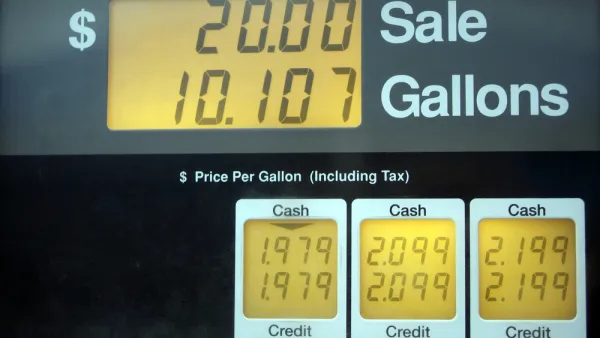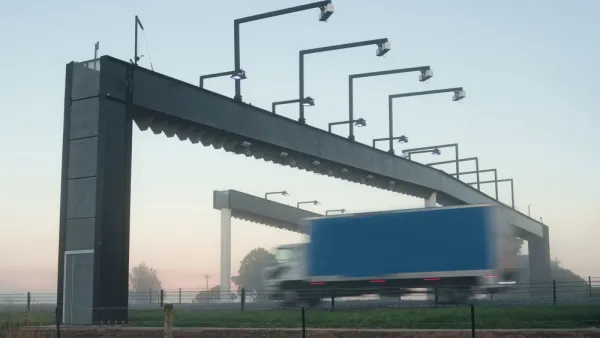Oregon's much heralded mileage fee program, known as OReGO, has selected the technology to record the miles driven by participants. A French and Canadian company will collaborate to provide a telematics road usage charging framework to begin July 1.
"Oregon’s Department of Transportation [ODOT] has teamed up with road-tolling company Sanef ITS Technologies America Inc., the Long Island, N.Y., unit of a French company, and connected car company Intelligent Mechatronic Systems Inc., of Waterloo, Ontario," writes Hannah Lutz. "Intelligent Mechatronic Systems will provide a device that plugs into a vehicle’s on-board diagnostics [OBD] port to gather mileage data used to determine the usage charge."
The technology used to describe the mileage-recording program is telematics, "literally a combination of the words Telecommunications and Informatics," according to Fleetmatics. "Under the 'telematics' umbrella is the integration of Global Positioning System (GPS) technology and computers and mobile devices."
OReGO will begin on July 1 for 5,000 volunteer participants in the "road usage charge" program. In addition to Sanef and IMS, Azuga and Geogia-based Verizon Telematics will also be vendors in the program. "Volunteers will have their choice of secure mileage reporting options offered by OReGO’s private-sector partners," according to the website, and there must be at least one "non-GPS" option per the enabling legislation, stated ODOT spokeswoman Michelle Godfrey in a phone call.
Mileage Fee: 1.5 cents per mile driven
According to an email from Lutz, participants "will receive a statement from the companies that tells them how much they owe. They calculate that against [31.07-cents per gallon state] gas tax paid, and then the participants could either be issued a refund or they may have a balance to pay."
Since the flat rate benefits low mileage vehicles, there are restrictions on how many of them will be eligible to participate, according to the volunteer webpage:
- No more than 1,500 vehicles rated at less than 17 mpg.
- No more than 1,500 vehicles rated from 17 to less than 22 mpg.
"The rate of 1.5 cents per mile was designed to be revenue-neutral for the state fuel tax and equates to the state’s current vehicle fleet fuel economy, which is approximately 20 mpg," according to the FAQ. "The per-mile rate will likely be revisited in future legislation as the vehicle fleet fuel economy changes due to the 2025 Corporate Average Fuel Economy federal standard."
Other states are also working to implement mileage-based user fees, but Oregon is the most advanced, having already completed two pilot programs. Other states have implemented electric vehicle registration fees to ensure they pay for road upkeep normally paid through gas taxes.
FULL STORY: Oregon prepares nation's first per-mile road tax Alternative to per-gallon tax anticipates rise in EVs

National Parks Layoffs Will Cause Communities to Lose Billions
Thousands of essential park workers were laid off this week, just before the busy spring break season.

Retro-silient?: America’s First “Eco-burb,” The Woodlands Turns 50
A master-planned community north of Houston offers lessons on green infrastructure and resilient design, but falls short of its founder’s lofty affordability and walkability goals.

Delivering for America Plan Will Downgrade Mail Service in at Least 49.5 Percent of Zip Codes
Republican and Democrat lawmakers criticize the plan for its disproportionate negative impact on rural communities.

Test News Post 1
This is a summary

Test News Headline 46
Test for the image on the front page.

Balancing Bombs and Butterflies: How the National Guard Protects a Rare Species
The National Guard at Fort Indiantown Gap uses GIS technology and land management strategies to balance military training with conservation efforts, ensuring the survival of the rare eastern regal fritillary butterfly.
Urban Design for Planners 1: Software Tools
This six-course series explores essential urban design concepts using open source software and equips planners with the tools they need to participate fully in the urban design process.
Planning for Universal Design
Learn the tools for implementing Universal Design in planning regulations.
EMC Planning Group, Inc.
Planetizen
Planetizen
Mpact (formerly Rail~Volution)
Great Falls Development Authority, Inc.
HUDs Office of Policy Development and Research
NYU Wagner Graduate School of Public Service





























